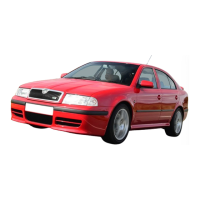
Do you have a question about the Skoda ENYAQ iV 2020 and is the answer not in the manual?
| Brand | Skoda |
|---|---|
| Model | ENYAQ iV 2020 |
| Category | Automobile |
| Language | English |
Details regarding the extended warranty for the vehicle, including limitations and duration.
Information about the primary vehicle owner, including contact and address details.
Details for a second vehicle owner or alternative contact person.
Explains the manual's applicability, scope, and illustration conventions for all vehicle variants.
Information on accessing the digital version of the owner's manual online and via app.
Defines key terms used throughout the manual, such as "Specialist garage" and "ŠKODA Partner".
Explains abbreviations and common text notations like "Press" and "Hold" for button actions.
Clarifies directional terms used in the manual, like "left", "right", "front", and "rear".
Explains the meaning of warning symbols like DANGER, WARNING, CAUTION, and NOTICE.
Guide on using interactive images, symbols, and topics within the infotainment system.
Identifies and describes components located in the front area of the vehicle.
Identifies and describes components located in the rear area of the vehicle.
Details the controls and features on the driver's seat.
Describes components and controls on the centre console and passenger seat.
Explains the location and access to the space under the front flap.
Explains the purpose and importance of warning lights and associated messages.
Provides a list and meaning of various warning lights and their symbols.
Essential guidelines for the correct and safe operation and maintenance of the vehicle.
Advises on initial handling of new brake pads and tyres for optimal performance.
Lists essential checks to perform on the vehicle before driving for safety.
Warns against improper vehicle modifications and recommends specialist garages for adjustments.
Emphasizes the importance of keeping sensors and cameras clean for optimal system function.
Provides safety instructions for working in the space under the front flap.
Details safe handling procedures for operating fluids like coolant and brake fluid.
Safety precautions for using electrical sockets in the vehicle to prevent shocks or fires.
Checklist of actions to perform before starting a journey for occupant safety.
Guidelines for ensuring a safe and correct sitting position for all occupants.
Instructions on how to correctly arrange seat belt webbing for maximum protection.
Guidance on the correct steering wheel position to minimize injury from airbag deployment.
Rules and recommendations for safely transporting children using child seats.
Advice on securely stowing objects to prevent them from becoming hazards during driving.
General principles for safe driving, including adapting to conditions and paying attention to warnings.
Procedures for safely parking and securing the vehicle to prevent rolling.
Warnings about leaving children unattended and safety features when locking the vehicle.
Advice on precautions for operating the vehicle in different weather conditions.
Information on how the emergency call system works and what to be mindful of.
Steps to take after an accident, including safety measures and reporting.
Overview of the vehicle key, its functions, and how to remove the key bit.
Step-by-step instructions on how to remove the mechanical key bit from the remote control.
Solutions for common issues with the key, such as a low battery.
Explains the functionality of the central locking system, including unlock/lock indicators.
Details the SAFE function which prevents doors opening from inside when locked.
Instructions on how to deactivate the SAFE function through double locking or settings.
Explains the usage and operation of the keyless locking system for vehicle access.
Options for deactivating or permanently deactivating keyless locking via the infotainment system.
Describes the functionality and triggering events of the vehicle's alarm system.
Procedures to stop an active alarm by unlocking the vehicle or turning on the ignition.
Setting for automatic unlocking the vehicle when the key is near.
Instructions for opening and closing vehicle doors from both the outside and inside.
Explains the operation of the child safety lock to prevent rear doors opening from inside.
Details on operating electric windows, including force limiter and child lock functions.
Information on operating the sliding/tilting sunroof, including pinch protection and winter conditions.
Instructions for operating the electrically controlled sunblind for the sunroof.
How to operate and adjust the sun protection roller blinds for rear door windows.
Instructions on folding and adjusting sun visors, with safety warnings.
Steps for opening and closing the boot lid manually, with operating notices.
Operation of the electrically controlled boot lid, including settings and troubleshooting.
How to use the contactless feature to open/close the boot lid with a foot gesture.
Manual procedure for unlocking the boot lid if it fails to open automatically.
Details manual controls for adjusting the front seat's longitudinal position, height, and backrest.
Explains the operation of electrically adjustable front seats, including lumbar support.
Guide on adjusting the curvature position and extent of the lumbar support.
How to store and retrieve preferred seat and mirror positions using memory buttons.
Instructions for turning the seat massage function on/off and its automatic switch-off feature.
Procedures for folding down rear seat backs and adjusting headrests.
Steps for folding rear seat backrests forward from the luggage compartment.
Guidance on placing rear seat belts in the correct position for seat folding.
Instructions on how to adjust front and rear headrests for optimal safety.
Adjusting the height and folding down the front armrest, with safety warnings.
How to fold down the rear armrest, which can also serve as a storage table.
Instructions for opening and closing the load-through device in the rear seat.
Details on buttons/dials of the multifunction steering wheel and setting the steering wheel position.
Troubleshooting steps for power assisted steering faults indicated by warning lights.
Operation of the interior rear-view mirror, including manual and automatic dimming.
Operation of exterior wing mirrors, including manual/electric folding and adjustments.
How to activate/deactivate automatic mirror functions and adjust mirror surfaces.
Functionality, automatic belt retractors, belt tensioners, and status displays for seat belts.
Guidelines for installing and using child seats, including safety recommendations and regulations.
Lists recommended child seats grouped by weight and ECE-R 44 standard.
Information on using child seats with ISOFIX systems and TOP TETHER.
Table detailing ISOFIX system compatibility for different child seat groups and vehicle seats.
Table specifying child seat compatibility when using a safety belt.
General overview of ISOFIX and TOP TETHER systems for child seat installation.
Explains the ISOFIX system for secure child seat installation and its retaining eyelets.
Explains the function and deployment of airbags during collisions and what to avoid.
Recommends deactivating certain airbags and lists cases where it should be considered.
Instructions for using the key switch to deactivate/activate the front passenger airbag.
Functionality and operation of exterior lights, including daylight running and automatic switching.
Explains the automatic activation of exterior lights after ignition off or vehicle unlocking.
How the high beam assist system automatically switches high beam on and off.
Operation and functionality of the dynamic light assist system for automatic high beam adjustment.
Guidance on DIY replacement of specific light bulbs and precautions.
Instructions for replacing front turn signal bulbs in the headlight assembly.
Describes automatic switching on/off of interior lights and operation of make-up mirror lights.
Settings for ambient lighting, including colour, brightness, and pre-selection options.
Operation of windscreen wipers and washers, including automatic wiping and fluid refilling.
Comprehensive guide to the automatic climate control system, including modes and settings.
Operation and settings for the heated windscreen feature for defrosting and demisting.
Instructions for operating seat heating for front and rear seats, with safety advice.
How to turn the heated steering wheel on/off and adjust heating output.
Overview of the digital instrument cluster display, buttons, and settings like language and time.
Explains the head-up display functionality, settings, and potential restrictions.
How to display, save, and reset driving data like distance travelled and average speed.
Information on the recuperation process and display of available mileage, including restrictions.
How to check the vehicle status, including warnings, service appointments, and tyre pressure.
Using the SET button for quick access to various vehicle settings and driver assistance systems.
General overview of the infotainment system, touchscreen operation, and HOME menu usage.
How to set and manage preferred functions in the infotainment status bar for quick access.
Accessing and customizing menus within the infotainment system.
Guides the user through setting up infotainment functions and resetting to factory defaults.
Basic system settings including time, date, language, and factory resets.
Adjusting audio settings like equalizer, volume, and sound profiles.
Using the infotainment keypad for text input, search, and managing languages.
Accessing and managing preferred functions and settings via the Control Centre.
How to use voice control for operating vehicle functions and infotainment system.
Overview of FM radio functions, player controls, and station lists.
Explains DAB radio reception, player controls, and available stations.
Instructions for using the WEB radio player and podcast features.
Overview of media player controls for audio and video playback.
How to manage media files, favourites, and supported audio/video formats.
Managing connected mobile devices, including cybernetic security and software updates.
Security measures to protect vehicle systems from unauthorized access via mobile devices.
Factors affecting feature availability and compatibility of mobile devices and apps.
Information on checking mobile device compatibility with the infotainment system.
Using mobile device applications to enhance infotainment features and vehicle operation.
Details on ŠKODA applications available for download and their functionality.
Step-by-step guide for connecting mobile devices to the infotainment system via Bluetooth or Wi-Fi.
Overview of phone features, managing contacts, and connecting telephones to infotainment.
How to manage phone contacts, including preset buttons and sorting options.
Functions available during a telephone conversation, such as holding calls and managing the microphone.
Instructions for making and managing conference calls with multiple participants.
How to send and receive text messages, including message viewing settings.
Instructions for sending and receiving emails, and managing email accounts.
Setting up and connecting to the voice mailbox number.
Using Wi-Fi for internet and SmartLink connections, managing hotspots, and troubleshooting.
Overview of SmartLink connection, supported types (Android Auto, Apple CarPlay, MirrorLink).
Connection overview and conditions for using Android Auto via USB or Wi-Fi.
Connection overview and conditions for using Apple CarPlay via USB or Wi-Fi.
Connection conditions and operation of the MirrorLink function.
Overview of the navigation map, display options, and map movement controls.
How to find destinations using input line, POI categories, or addresses.
Suggested destinations based on usage patterns, home/work addresses, and favourites.
Accessing and deleting the list of last destinations visited.
Managing favourite destinations for quick route guidance access.
Route calculation, changing destinations, navigation announcements, and traffic information.
Using demo mode to simulate route guidance and define starting points.
Regulations, functionality, and website information for ŠKODA Connect services.
Information about the ŠKODA Connect application for user registration and remote access.
Steps for user registration and activating ŠKODA Connect services using a ŠKODA ID.
Managing personal data protection settings, including privacy controls and data transmission.
Operating conditions and procedures for switching on the vehicle's ignition.
Selecting automatic gearbox modes (R, N, D/B), unlocking the gearbox, and troubleshooting.
Adapting vehicle driving behaviour using modes like Eco, Comfort, Normal, Sport, and Individual.
Operation of automatic recuperation and selecting recuperation levels with shift paddles.
Tips for economical driving, including using ECO mode and managing deceleration.
Important considerations and recommendations for safely towing a trailer.
How to remove front/rear caps, install towing eyes, and the towing process.
What to be mindful of regarding brakes, including fluid level inspection and specifications.
Operation of the electric parking brake, including manual and automatic switch-on.
Procedures for emergency braking when the brake system is faulty.
How Auto Hold secures the vehicle when stopped and its status display.
Information about the e-Sound system that generates artificial engine noise.
Overview of systems like ESC, ASR, ABS, and MSR for vehicle stability and braking.
How EDL helps stabilize the vehicle on different grip surfaces by braking spinning wheels.
DSR provides steering recommendations to stabilize the vehicle in difficult situations.
How Hill Hold Control assists in starting on uphill gradients by temporarily braking the vehicle.
MCB helps decelerate and stabilize the vehicle after a collision to reduce further risks.
How TSA helps stabilize a trailer by slowing down the vehicle during trailer sway.
eBKV facilitates brake pedal operation and enables regenerative braking for battery charging.
Explains how regenerative braking generates energy stored in the high-voltage battery.
Front Assist monitors distance, warns of collisions, and provides braking intervention.
Pedestrian recognition system that aids in preventing collisions with pedestrians via automatic braking.
Controls the maximum driving speed according to the set speed limit.
How the cruise control system maintains a set speed without constant accelerator pedal use.
ACC maintains set speed and distance to the vehicle ahead, with automatic stop and start functionality.
Helps keep the vehicle within lane markings using steering interventions.
Combines Lane Assist and ACC to help maintain lane position and control speed.
Uses optical signals in mirrors to alert drivers of vehicles in blind spots during lane changes.
Displays road signs and speed limits in the instrument cluster for driver awareness.
Proactive safety measures triggered in dangerous situations to protect occupants.
Evaluates steering behaviour to detect driver fatigue and recommend breaks.
Detects driver inactivity and performs measures to safely decelerate the vehicle to a stop.
Eco Assist provides instructions for economical driving and recuperation levels.
Overview of parking assistance systems available in the vehicle.
Parking aid that detects obstacles and provides visual/audible warnings and automatic braking.
Displays the area behind the vehicle with orientation lines and functional surfaces during reversing.
Assists parking by displaying the vehicle's area from multiple camera views.
Displays side camera views to assist with parking maneuvers.
Warns of approaching vehicles when reversing and automatically brakes if necessary.
Warns about approaching objects when opening doors to avoid collisions.
Important safety information regarding high-voltage components and batteries.
Procedures and precautions for charging the high-voltage battery correctly.
Settings for adjusting charging processes, including departure times and charge limits.
Information on using universal and charging station cables, including country-specific differences.
Instructions on how to open the front flap and safety precautions before opening.
How to check coolant level, top up, and safety instructions for refilling.
What to be mindful of regarding the 12V battery, including warning symbols and discharge protection.
Procedure for jump-starting the vehicle using another vehicle's 12V battery.
Functionality of fuses, conditions for replacement, and high-voltage system fuse details.
Accessing and replacing fuses located in the dash panel storage compartments.
Advice on tyre care, causes of uneven wear, wheel changes, and tyre labelling.
Benefits of all-season/winter tires, usage conditions, and speed limit settings.
Usage and fitting instructions for snow chains to improve winter driving conditions.
Information on SEAL tyres, their increased resistance to air leakage, and replacement.
Step-by-step guide for changing a wheel, including safe jacking procedures.
Content overview and usage of the breakdown kit for temporary tyre repair.
Instructions for removing and installing wheel bolt cover caps and full wheel trims.
Functionality of the tyre pressure monitoring system and saving tyre pressure values.
Overview of equipment and storage compartments located in the vehicle's boot.
Location and placement of emergency equipment like warning triangles and first-aid kits.
Contents and overview of the vehicle's tool kit, including breakdown set.
Location of the storage compartment for the reflective vest in the front door.
Types of fasteners in the boot for securing loads and luggage, with load limits.
Describes storage compartments for cargo elements and their maximum load.
Overview and maximum load capacity of fastening nets for securing items in the luggage compartment.
Instructions for attaching and folding the net partition in the luggage compartment.
Details on storage compartments for cargo elements located under the variable loading floor.
How to set the position of the variable loading floor and its maximum load.
Instructions for using the organiser located under the variable loading floor.
Information on the charging cable pocket and its maximum load capacity.
Overview of front interior storage compartments like make-up mirror, ticket holder, and glove compartment.
Description of rear interior equipment such as coat hooks, folding tables, and storage pockets.
Location and usage of the storage pocket designed for mobile phones.
Location of the car park ticket holder, typically on the dashboard or A-pillar.
Details on the bottle tray in the front door storage compartment and its capacity.
Description of the bottle tray in the rear door storage compartment and its capacity.
Information on USB connections for charging and data transfer purposes.
Location and usage of coat hooks on the centre body pillar with load limits.
Location of the pen holder, typically in the centre console or glove compartment.
Describes storage compartments for small items like cards, coins, and SD cards.
Location of a specific storage compartment for cards on the driver's side.
Location of the dedicated storage compartment for an umbrella.
Functionality of the phonebox for wireless charging and signal amplification.
How to use and adjust the front cup holders, including safety notices.
Operation of the easy-open cup holder for convenient bottle access.
Usage and warnings related to the ashtray, particularly regarding hot objects.
How to fold and unfold the folding table, with an injury risk warning.
Instructions for removing and inserting items stored in the ceiling compartment, like blankets.
How to secure a tablet in its dedicated storage compartment using a rubber band.
Operating conditions and troubleshooting for the 12-volt power socket.
Functionality and status display of the 230-volt power socket.
Information on 230-volt sockets and USB connections for charging devices.
Technical data for the roof rack, including maximum load capacity.
Operation of the swivelling tow bar, including swinging it out/in and checking latches.
Considerations for mounting accessories like bicycle carriers, including length and weight limits.
Importance of service intervals, notifications, and the proof of service.
Guidelines for modifications, repairs, and technical alterations by ŠKODA AUTO.
Recommends using ŠKODA Service Partners for repairs and modifications.
Recommendation to use ŠKODA Genuine Parts for safety, reliability, and suitability.
What to be mindful of when cleaning the vehicle interior, including materials and cleaning agents.
What to be mindful of when cleaning the vehicle exterior, including washing and wax preservation.
Location and usage of the ice scraper found in the luggage compartment lid.
Where to find emission standards, fuel consumption, and other technical data.
Locating the Vehicle Identification Number (VIN) and engine number.
Information on maximum permissible weights found on the vehicle's nameplate.
Information about the vehicle's operating weight, including tare weight and payload components.
Specifications for vehicle height, width, ground clearance, and length.
Explains the purpose and data recorded by the EDR in the event of an accident.
Information on the collection, processing, and use of personal customer data by ŠKODA AUTO.
Details rights related to material defects, ŠKODA warranty for new cars, and mobility warranty.











